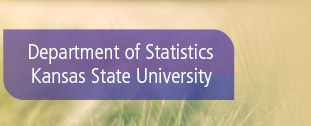Abstract
In order to gain regulatory approval to market a new seed product derived with biotechnology, grain and forage composition data must be collected from field trials, and summaries must be reported to various government agencies. Currently, both tests of differences in composition between a genetically modified organism (GMO) and its control and tests of equivalence of the GMO to conventional genotypes are required by regulatory agencies. Bayesian analyses offer an attractive option for regulatory assessments by expressing results that can be interpreted more easily by a wide audience and by providing more ways to examine various hypotheses of interest. In order to extend Bayesian methodology for application to different compositional analytes, and to take advantage of the information obtained in previous experiments, the use of informative prior distributions for composition studies is proposed. Methods for determining suitable informative prior distributions analytically are shown in four situations: (1) eliciting opinions from an expert, (2) finding the best fit from an overdetermined set of summary statistics from one previous study, (3) performing a meta-analysis of summary statistics from previous studies with an assumed common prior distribution, and (4) performing a different meta-analysis with the prior distribution determined by a mixture of different assumed prior distributions from previous studies. Examples from soybean composition studies are used to illustrate these techniques.
Keywords
Bayes, Markov Chain Monte Carlo, Prior Distribution, Genetically Modified Organism, Regulatory, Composition
Creative Commons License

This work is licensed under a Creative Commons Attribution-Noncommercial-No Derivative Works 4.0 License.
Recommended Citation
Harrison, Jay M.; Culp, Derek; and Harrigan, George G.
(2012).
"BAYESIAN MCMC ANALYSES FOR REGULATORY ASSESSMENTS OF FOOD COMPOSITION,"
Conference on Applied Statistics in Agriculture.
https://doi.org/10.4148/2475-7772.1029
BAYESIAN MCMC ANALYSES FOR REGULATORY ASSESSMENTS OF FOOD COMPOSITION
In order to gain regulatory approval to market a new seed product derived with biotechnology, grain and forage composition data must be collected from field trials, and summaries must be reported to various government agencies. Currently, both tests of differences in composition between a genetically modified organism (GMO) and its control and tests of equivalence of the GMO to conventional genotypes are required by regulatory agencies. Bayesian analyses offer an attractive option for regulatory assessments by expressing results that can be interpreted more easily by a wide audience and by providing more ways to examine various hypotheses of interest. In order to extend Bayesian methodology for application to different compositional analytes, and to take advantage of the information obtained in previous experiments, the use of informative prior distributions for composition studies is proposed. Methods for determining suitable informative prior distributions analytically are shown in four situations: (1) eliciting opinions from an expert, (2) finding the best fit from an overdetermined set of summary statistics from one previous study, (3) performing a meta-analysis of summary statistics from previous studies with an assumed common prior distribution, and (4) performing a different meta-analysis with the prior distribution determined by a mixture of different assumed prior distributions from previous studies. Examples from soybean composition studies are used to illustrate these techniques.

